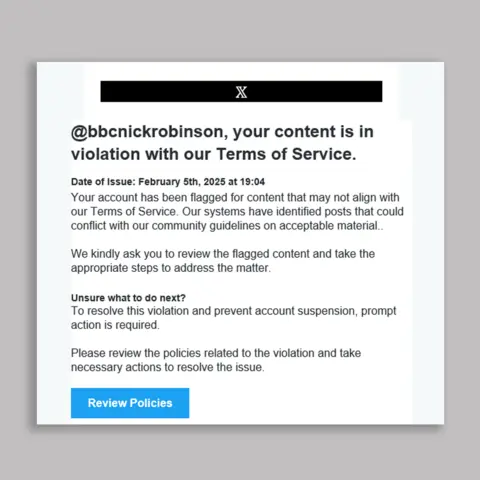Nick Robinson's X account hacked to promote crypto
He said: "Why? Because my defences were down - I was tired after a very long day, I was rushing, and the phishing email made me think that if I didn't act fast I'd be in trouble.
"However, I didn't just fall for it. I tried repeatedly to use the official authentic X site to deal with the problem I was being alerted to, and only after trying again and again and failing did I think 'oh sod it, what's the worst that can happen?'
"Well now I know. I should have thought the opposite - i.e. if this alleged problem is really serious they'll be in touch again."
He added: "My main mistake was not to check the email address which made clear it wasn't X that were contacting me but a hacker. Everything else looked just like the real thing."


Robinson told Today listeners the hack came days after he was "swamped by critical messages" from supporters of Elon Musk after he had pointed out a statement made by the billionaire owner of X was untrue.
His Today co-host Amol Rajan had raised the hack, joking that his "very own tech bro, the mighty Nick Robinson, has finally succumbed to the temptations online, and I see overnight, is launching a cryptocurrency".
"This is the big news in Britain, and what listeners want to know, Nick, is how do they invest?," he added.
Robinson said his account had been used to make it look like he was launching a cryptocurrency called '$Today' on the Solana blockchain platform.
"So if you read that, it's complete nonsense, quite entertaining nonsense," Robinson told the programme.
He added: "But there's a lesson learned - don't click on everything you see."
Toby Lewis, global head of threats analysis at cyber-security firm Darktrace, said Robinson was likely caught up in a scam where people with large amounts of social media followers are sent automated phishing emails after being identified by computer code.
But he added that anyone can be targeted and fall victim to similar hacking scams.
"There are signs we can look out for. But the problem with these emails is they are designed to attack us when we are distracted and busy," he said.
"Good advice is don't don't click links in emails. If it's an important message, it will be there on the relevant website for me when I log on to it.
"But with these type of threats, they will always evolve."
X has been approached for comment.










